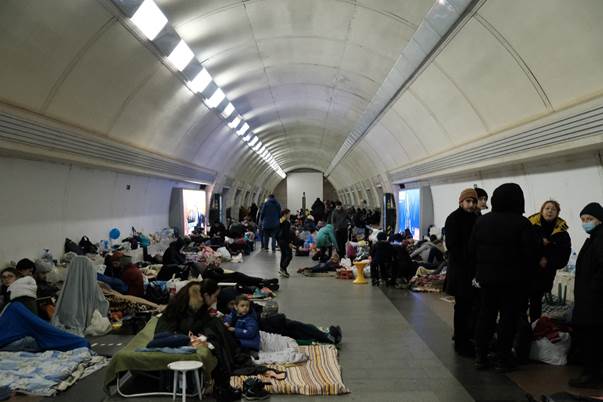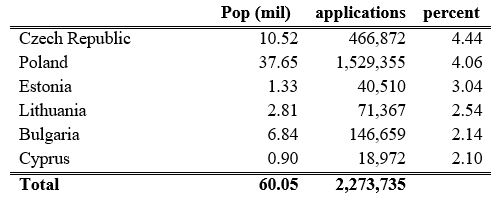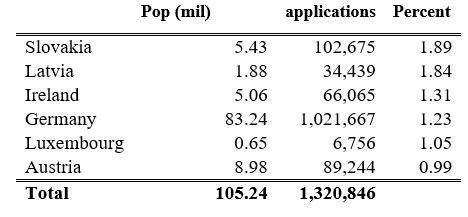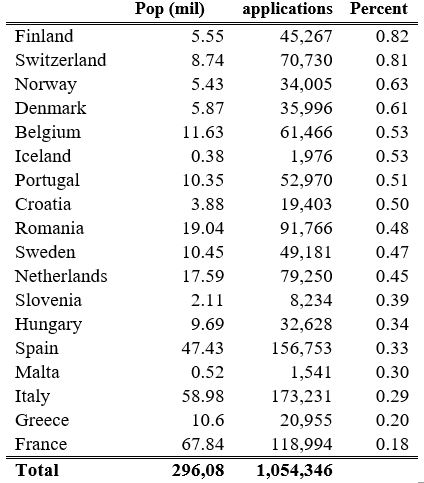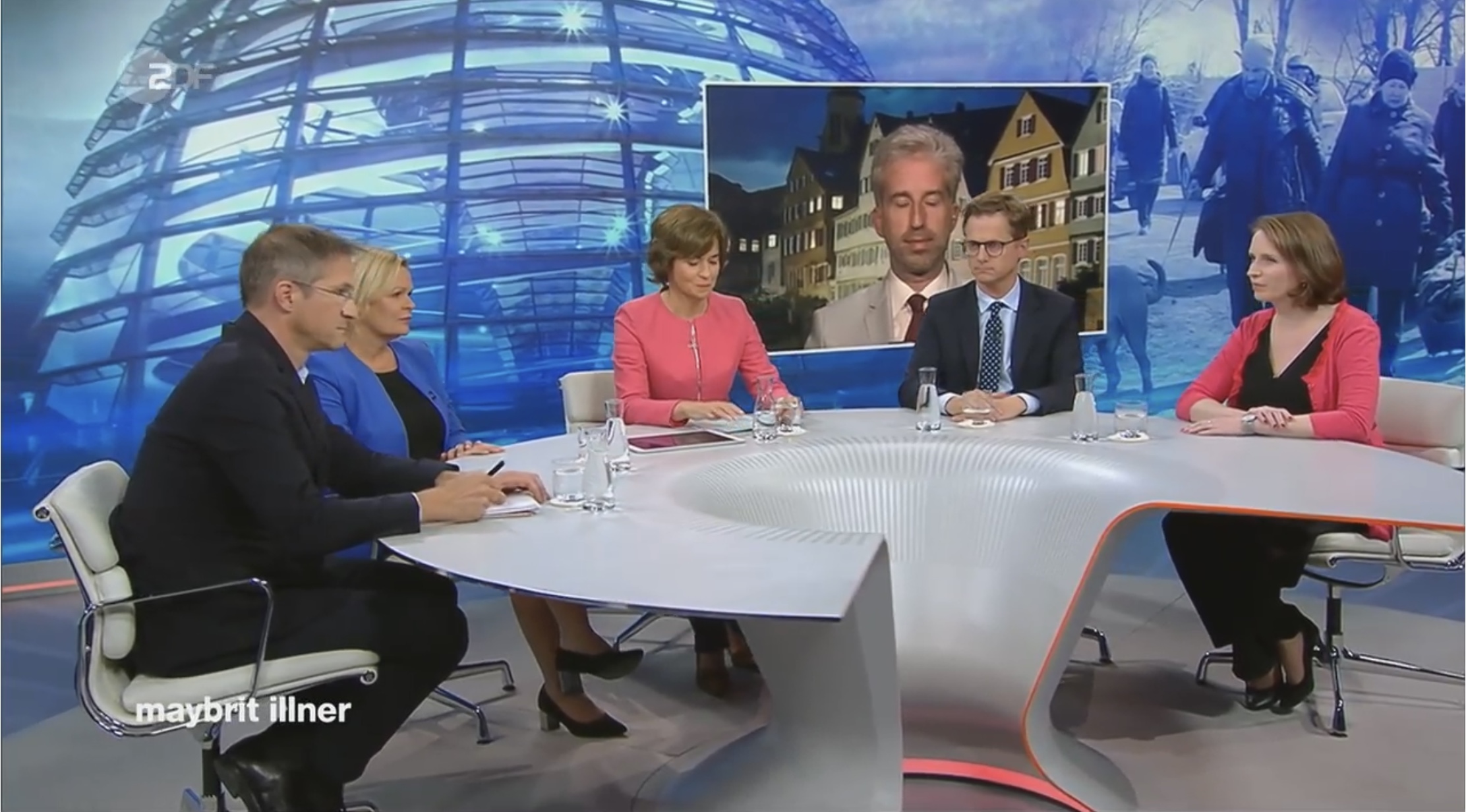Putin’s Cholodomor – Homes for Ukrainians – A plan for winter
- 4.6 million refugees
- Cholodomor – “death by cold”
- European solidarity … and its limits
- Berlin versus Paris
- Homes for Ukrainians across Europe?
- Background facts – where Ukrainians went
- ESI on Ukrainian refugees in the media
Dear friends,
After Russia’s full-scale invasion of Ukraine began on 24 February it only took five weeks for 2.4 million people to cross the border from Ukraine to Poland. During the same time, 0.4 million returned from Poland to Ukraine, many going back to defend their country. This was a net outflow of 2 million people. Many more Ukrainians crossed to the EU in Slovakia, Romania, Hungary and via Moldova. By contrast, the number of people crossing from Turkey to Greece in the twelve exceptional months from April 2015 to March 2016 was only one million.
4.6 million refugees
By the end of 2022, more than 4.6 million Ukrainians had asked for temporary protection in the EU. More than 150,000 fled to the United Kingdom. More than 70,000 remained in Moldova. It is already the biggest refugee movement in Europe since the 1940s.
In addition to millions of Ukrainian refugees, there were more than 6.5 million internally displaced persons (IDPs) in Ukraine by October 2022. By then, more than a quarter of the total pre-war population had been displaced from their homes. This was, alas, not unexpected.
Vladimir Putin’s previous wars – in Chechnya from 1999, in Eastern Ukraine from 2014, in Syria in support of Bashar al-Assad from autumn 2015 – had all seen mass displacements of civilians following indiscriminate attacks and terror. This happened again here, even if the invasion of Ukraine did not go according to Putin’s plans.
The Ukrainian military managed to defend Kyiv, Kharkiv and Odesa. It was able first to stop, and then to push back the Russian invader from March onwards. This also caused the refugee movement to reverse. From mid-April 2022, after Ukraine won the battle of Kyiv, more people left Poland to return to Ukraine than came to Poland:
In May, 647,100 arrived in Poland, but 771,100 returned.
In June, 715,300 arrived in Poland, but 768,500 returned.
In July, 721,900 arrived in Poland, but 771,100 returned.
In August, 781,500 arrived in Poland, but 876,000 returned.
In September, 737,400 arrived in Poland, but 746,100 returned.
In these five months, 3.6 million arrived, and 3.9 million returned.
This changed again only in October. Under the new commander Sergey Surovikin, previously in charge of the Russian air force in Syria in 2019, Russia began to systematically attack essential infrastructure. In Syria, as Human Rights Watch wrote in 2020, Russian forces under Surovikin’s command had struck Syrian “homes, schools, healthcare facilities, and markets – the places where people live, work, and study”. Now Putin’s military repeated this with missiles and drones against Ukraine.
In October, 740,700 people arrived in Poland and 729,100 returned.
In November, 669,700 people arrived, and 648,600 returned.
How many Ukrainian refugees will there be at the end of 2023? The lesson from 2022 is clear: it all depends on the course of the war.

Dark Ukraine – Europe at night 21 December 2022 (NASA Black Marble)
Cholodomor – “death by cold”
In late 2022, both the German Bundestag and the European Parliament recognized Stalin’s engineered famine in Ukraine ninety years ago as genocide. The Holodomor (“death by starvation”), one of the worst crimes committed by the Soviet Union, killed four million Ukrainians.
In late 2022, Ukrainians started to speak about Putin’s Cholodomor (“death by cold”) as a murderous new tactic by the Russian armed forces to plunge Ukraine into cold and darkness in winter.
History suggests that this strategy will fail, again. In May 1940, following the German occupation of Belgium and the Netherlands, UK prime minister Winston Churchill addressed his nation:
“We shall defend every village, every town and every city. The vast mass of London itself, fought street by street, could easily devour an entire hostile army. And we would rather see London laid in ruins and ashes than that it should be tamely and abjectly enslaved.”
A winter of hell followed. German attacks from the air started on 7 September 1940 and lasted until May 1941. During this time, the Nazi war machine tried to terrorize the United Kingdom into submission. It destroyed 1 million homes and caused 43,000 deaths among British civilians. And yet, it failed: British resolution was stiffened, not broken. The United Kingdom, supported by allies, went on to win the war.
For many months now, Russian politicians and pundits have made the case for ruthless attacks on Ukrainian civilians: to terrorize them into submission, to destroy their state, to erase their identity and to trigger an even bigger refugee movement to polarize European societies and break their will to continue to support Ukraine. Dmitry Medvedev, former Russian president and current deputy chair of its security council, has called the invasion of Ukraine a battle against Satan, referred to officials in Kyiv’s government as “cockroaches” and explained that “Kyiv is just a Russian city where people always thought and spoke Russian.” Moscow City Duma deputy Andrey Medvedev called for “the liquidation of Ukrainian statehood in its current form.” Talk show hosts like Vladimir Solovyov call for “bombing Ukraine into the Stone Age,” and destroying all electricity and heating in Ukraine. Many of his guests echo him. Most importantly, Russia's armed forces act like this.
Ukrainian officials responded defiantly:
“We are one step away from massive blackouts as the freezing winter approaches. Our armed forces intercept most of Russia’s missiles, but there are so many of them – several dozen in each salvo – and those that do hit are enough to leave millions of people dark and cold. Sometimes for hours, sometimes for days. But darkness will always be better than slavery. To stay free, we need further help from our friends and allies.”
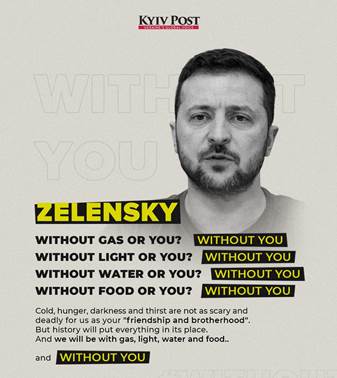
Speech by President Volodymyr Zelensky in September
In late October, Ukrainian Prime Minister Denys Schmyhal told a German daily that Russia wanted “a new refugee crisis in the EU”: “If there is no electricity, no heating, no water in Ukraine, it could trigger a new migration tsunami.”
European solidarity … and its limits
The United Kingdom survived the German Blitz. It later went on to win the war. But during the Blitz it also managed to save many lives by evacuating people from the most exposed cities.
This is also the best way to think about offering temporary protection to Ukrainians elsewhere in Europe: it is a way for some Ukrainians – in particular, women and children – to be out of danger, while their relatives fight to defend their homeland.
For this to work, European democracies must be ready to accept them. Are they?
In early March 2022, EU interior ministers took a decision to offer all Ukrainians fleeing to the EU temporary protection. Since then, Ukrainians could apply for protection anywhere in the EU. Switzerland, Norway and Iceland, not EU-members, took similar decisions.
But where did Ukrainians go? Two things are striking.
First: most Ukrainians were taken in by private households. And second: Ukrainian refugees distributed themselves very unevenly across Europe.
See below: Background facts
The Czech Republic and Poland received more than three times as many applications per capita as Germany.
The Czech Republic, with a population of 11 million people, received more Ukrainian applications than France, Italy and Spain, with a population of 174 million, combined.
Germany, with a population of 83 million, received more Ukrainian applications than the 18 European countries lagging behind, which have a combined population of 296 million.
Ireland, with a population of 5 million, received 66,000 applications. France, with a population of 68 million, received 119,000. Bulgaria, with a population of 7 million, received more applications than France.
One factor is geographical proximity; though there are exceptions, such as Hungary and Romania. These two Ukrainian neighbors have received among the fewest applications for temporary protection. Hungary (with a population of 10 million) received fewer than Latvia (with a population of 2 million).
Another factor is the ease of getting by with a Slavic language. And a third factor is the financial support offered to Ukrainian refugees and to private households prepared to host them. This last point can be influenced by public policy.
Berlin versus Paris
In Berlin a Ukrainian mother and child have the right to:
Social support per month
Mother: €449
Child: €285 to 376 (depending on the age)
Together: €734 to 825
Rent support for an apartment of up to 65 m² per month
Up to: €515
Heating up to €122
A Ukrainian mother and child may also receive up to €300 for clothing and up to €1,000 for furniture. Health insurance and (if required) long-term care are also fully covered in Germany.
Ukrainian refugees in Paris have access to the same social benefits as other asylum seekers. This is called allocation pour demandeur d'asile or ADA (Information on ADA). Access to ADA means that in France a Ukrainian mother and child have the right to:
Social support per month
Mother: €204
Child: €102 (independent of age)
Together: €306
And to rent support if not accommodated in state accommodation
Rent up to: €222
Health insurance is covered fully. There is – for now – also some money for private hosts of Ukrainian refugees in France: €150 per month, which is paid retrospectively.
But can one live with this support? The average rent per square meter in France is between €14 and €35. At a price of €14 per square meter a mother and child can rent 16 square meters for two. The contrast to Germany, to Ireland, even to Lithuania, is stark.
Homes for Ukrainians across Europe?
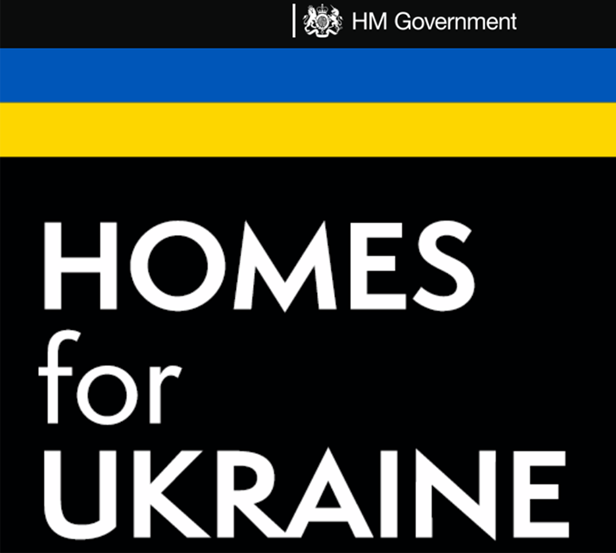
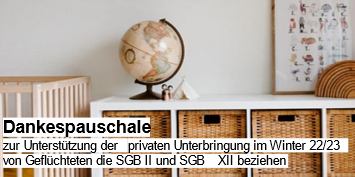
UK Homes for Ukraine – website – Proposal for German Thank you Payment
The United Kingdom is an outlier among European countries, the one country Ukrainian refugees can only enter with a visa.
With a population of 67 million, the UK took in just 0.2 percent of its population. This is more than France and Greece, but less than every other European Union member state. If the whole EU had acted like the UK, it would only have seen 1 million Ukrainian refugees enter.
Until 19 December, 152,200 Ukrainian visa-holding refugees arrived in the UK via two schemes: the Ukraine Family Scheme (43,300) and the Ukraine Sponsorship Scheme (109,000). The sponsorship scheme is also known as Homes for Ukraine.
Compared to the rest of Europe, these are low numbers. However, one aspect of the Homes for Ukraine programme should be an inspiration to the rest of Europe for this winter: Thank you payments for hosting families of £350 (around €400) per month for hosting families.
So far, this has worked very well. According to a survey conducted by the Office of National Statistics in July 2022:
- Only 6 percent said they wanted the arrangement to last less than 6 months.
- 19 percent said they were happy with the arrangement to last the agreed 6 months.
- 24 percent said they wanted the arrangement to last between 6 and 12 months.
- 37 percent said they were happy for the arrangement to last 12 months or more.
At the same time, Thank you payments made a real difference:
“Of those who planned to provide accommodation for between 6 and 12 months, 7 in 10 said continued £350 monthly payments would encourage them to host for longer.”
These payments did not create the wrong motivation:
“When asked what originally encouraged them to apply for the scheme, a minority (10%) of all sponsors selected the £350 monthly payments as a motivation … The most reported motivation for applying, by 94 percent of sponsors, was to help people fleeing a war zone. Around half of sponsors (51 percent) were motivated by having the space in their house to meet this need.”
The amount was not enough to attract profiteers, but it was high enough to make a real difference to those worried about rising costs:
“Around one-fifth (21 percent) of current or previous sponsors reported that the rising cost of living affected their ability to provide support on the scheme ‘quite a lot’; a further 9 percent said ‘very much’.”
In December 2022, the amount of Thank you payments increased to £500 a month “for guests who have been in the country for over a year … ‘Thank you’ payments will also be extended from 12 months to 2 years … where sponsors are willing to extend arrangements.”
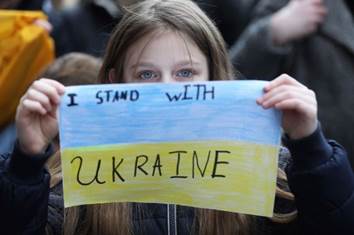
Welcoming Ukrainians in Dublin
In fact, the UK is no longer the only government offering such payments.
In March 2022, Ireland declared that it was ready to accept up to 100,000 refugees fleeing the war in Ukraine. Later, Ireland introduced a generous Accommodation Recognition Payment for hosting refugees from Ukraine (ARP):
“The Accommodation Recognition Payment (ARP) is a tax-free payment of €800 per month for each property used to provide accommodation to refugees from Ukraine ... The accommodation must be provided for at least 6 months and meet the required standards. You cannot get this payment if there is a rental agreement with the person being hosted.“
The Czech Republic and Slovakia are also offering stipends to hosts.
In recent weeks, the German NGO Alliance4Ukraine and ESI have launched a campaign for such a scheme to be introduced also in Germany: a Dankespauschale / Thank You Payment of €500 per month per hosting household, to be paid for renewable 4 or 6 months.
This would make sense for Germany even on its own, as there is an urgent need to support existing private hosts. It could also help mobilize more private accommodation as local authorities are increasingly struggling across Germany to host more refugees.
But the most important signal would be to other Europeans. For Europe to be able to cope with more Ukrainian refugees this winter such a programme would also be needed in France, Italy, the Netherlands or Sweden, countries that have so far taken relatively few Ukrainian refugees. If households in Lyon, Milan, Utrecht or Stockholm are ready to welcome Ukrainians, they should receive similar support from their governments. This would also help ensure a more balanced distribution of refugees in 2023.
Households in poor Moldova that host Ukrainian refugees should also receive monthly stipends from the EU.
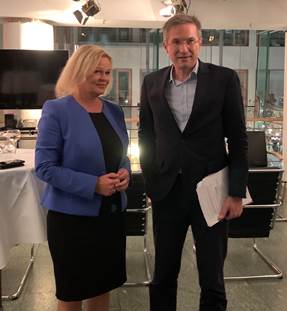
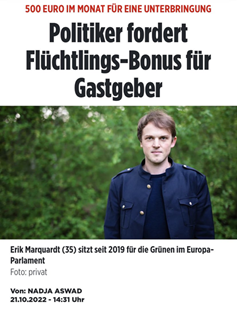
Making the case for German Thank you payments
Putin hopes to divide European societies. His instrument is terror against Ukrainian civilians.
A Europe-wide campaign that shows that civil societies, backed by governments, are prepared to host more Ukrainian refugees is also a powerful signal to Russia and to its fifth column inside the EU that Putin’s horrific blackmail will fail.
In the end, whether there will be 2 million, 10 million or 15 million Ukrainian refugees at the end of 2023 will depend on the success of Ukrainian resistance to Russia and on the military, financial and logistical support Ukraine receives from its allies: on more ammunition and air defense systems. On more generators and transformers. On battle tanks to address the “root cause” of Ukrainian mass displacement: Putin’s invading army.
But until Ukraine can win its war, European states need to be ready to help those who seek safety.
Yours sincerely,

Gerald Knaus
Since 24 February 2022, millions of Ukrainian refugees have left their country in the wake of Russia’s invasion. By December, 4.6 million Ukrainians had applied for temporary protection in the European Union or in Switzerland, Norway and Iceland.
Ukrainians seeking temporary protection in Europe, 6 December 2022
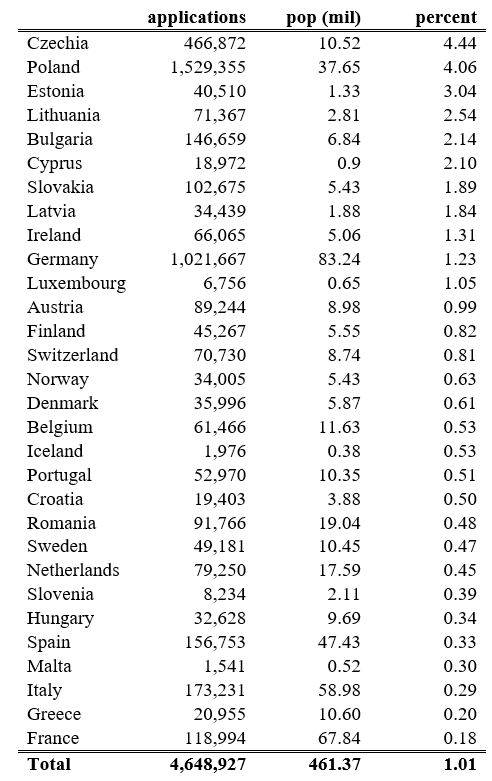
UNCHR, Ukraine Refugee Situation Dashboard, accessed on 12 December 2022, Population Data: Eurostat, “Population on 1 January”, December 2022.
Six countries received the highest number of applications for TP in relation to their population (more than 2 percent): the Czech Republic, Poland, Estonia, Lithuania, Bulgaria and Cyprus.
TOP SIX - Temporary protection applications 6 Dec 2022
Another six countries received applications equivalent to between 1 and 2 percent of their population: Slovakia, Latvia, Ireland, Germany, Luxemburg, and Austria.
MIDDLE SIX – Temporary protection applications 6 Dec 2022
LAGGING BEHIND – Temporary protection applications 6 Dec 2022
ESI on Ukrainian refugees in the media
Talk show Maybrit Illner - on Ukrainian and other refugees, 3 November 2022
ARD Knaus zur Flüchtlingssituation im Winter ("Knaus on the refugee situation in winter"), 19 December 2022
NRC, Duitsland en Frankrijk zetten in op migranten om arbeidstekorten te bestrijden ("Germany and France bet on migrants to combat labour shortages"), 16 December 2022
InfoMigrants 'Creative solutions' to a refugee housing problem in Hamburg,13 December 2022
NW Vorstoß: Bürger sollen ukrainische Geflüchtete aufnehmen und Geld erhalten ("Proposal: Citizens to take in Ukrainian refugees and receive money"), 12 December 2022
Mindener Tageblatt Vorstoß: Bürger sollen ukrainische Geflüchtete aufnehmen und Geld erhalten ("Proposal: Citizens to take in Ukrainian refugees and receive money"), 12 December 2022
Bote, Migrationsforscher Gerald Knaus: «Die meisten Ukrainer wollen ihr Land nicht verlassen. Es ist eine temporäre Flucht von Frauen und Kindern» ("Migration researcher Gerald Knaus: "Most Ukrainians do not want to leave their country. It is a temporary flight of women and children"."), 12 December 2022
Projecttogether, Private Unterbringung statt Notunterkünfte – Staat soll zivilgesellschaftliche Solidarität für ukrainische Geflüchtete unterstützen ("Private accommodation instead of emergency shelters - State should support civil society solidarity for Ukrainian refugees"), 7 December 2022
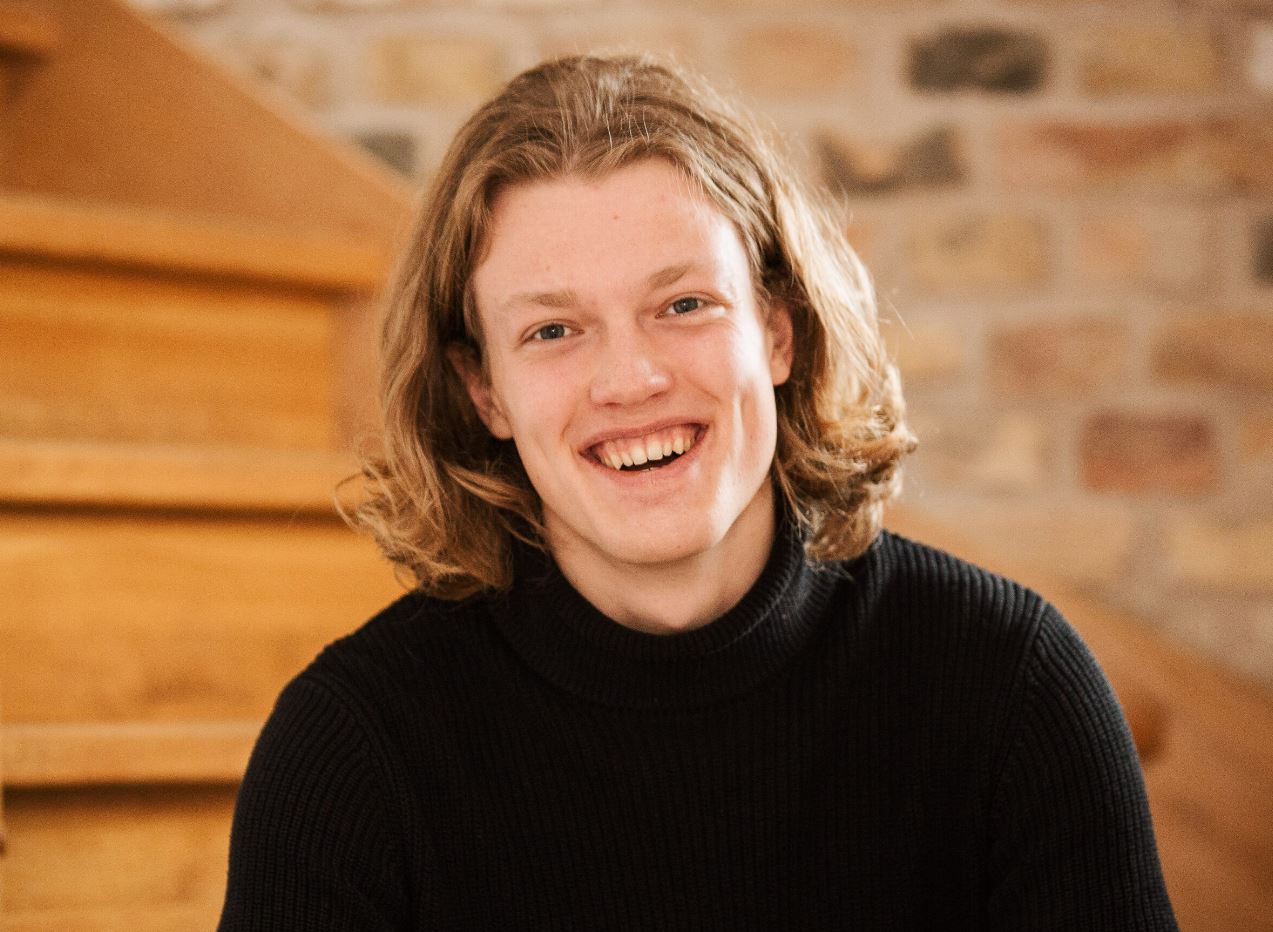
Freddi Lange from Project Together and Alliance4Ukraine
ARD, Einwanderungspolitik: Union fürchtet "Fehlanreize" durch neue Regelungen, ("Immigration policy: Union fears "wrong incentives" through new regulations"), TV Interview with Gerald Knaus, 5 December 2022
Augsburger Allgemeine, Migrationsforscher: Putins Terror könnte noch Millionen zur Flucht zwingen ("Migration researcher: Putin's terror could still force millions to flee") Interview with Gerald Knaus, 3 December 2022
Pulshr.pl, Przybędzie uchodźców z Ukrainy. Warszawa i Kraków podawane za przykłady
("Refugees from Ukraine will arrive. Warsaw and Krakow given as examples"), 3 December 2022
Süddeutsche Zeitung, "Putins Strategie, durch Terror die Menschen zu vertreiben, geht weiter" (""Putin's strategy to drive people away through terror continues".") Interview with Gerald Knaus, 2 December 2022
ZDF, Markus Lanz vom 29. November 2022 ("Markus Lanz from 29 November 2022") Gerald Knaus on German TV debate show Markus Lanz, 30 November 2022
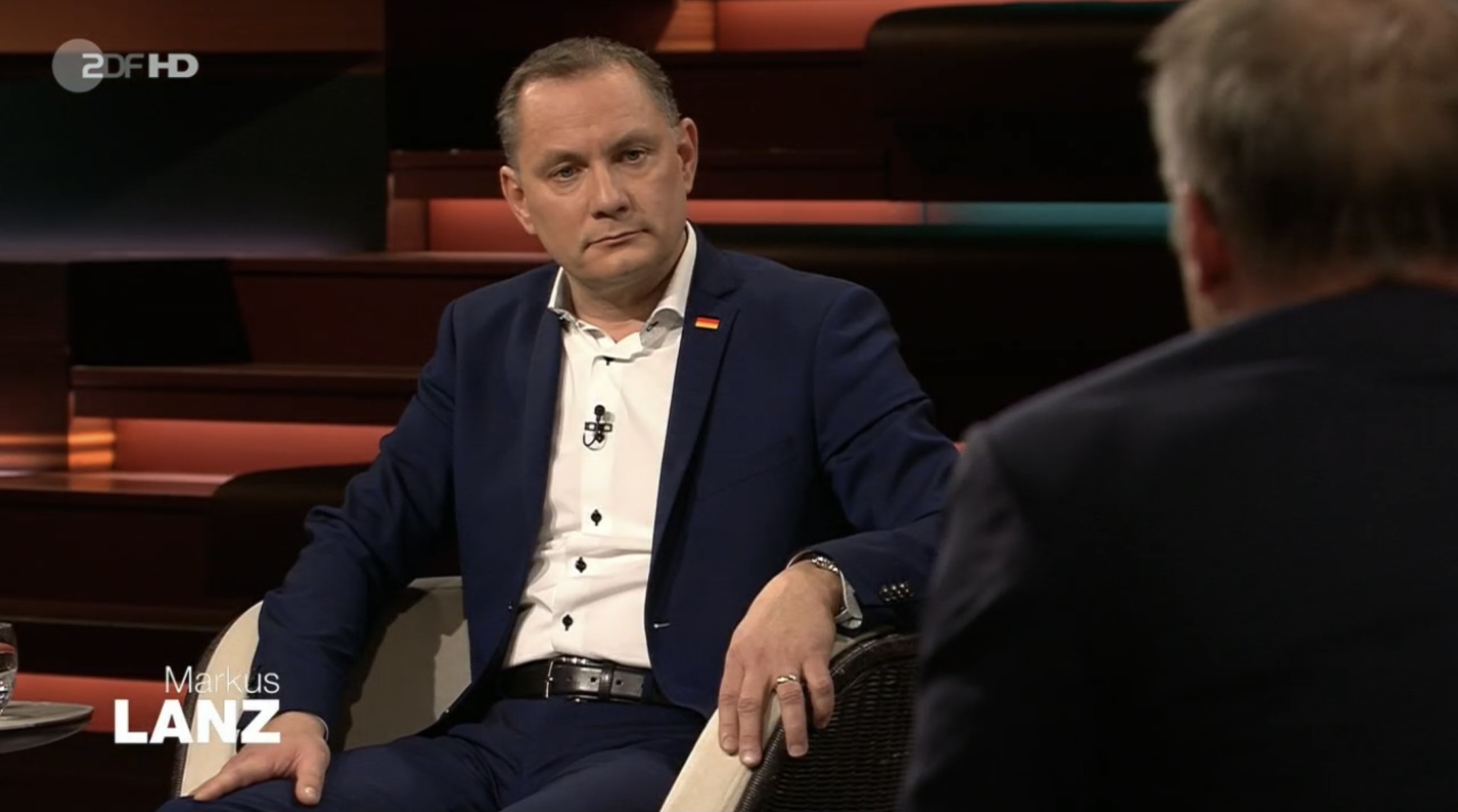
Debating Ukraine with leader from the German far right AFD
Focus, AfD-Chef nennt Putin-Ziele bei Lanz, Talkgast greift ein: „Wie bei Stalin ("AfD leader names Putin targets on Lanz, talk show guest intervenes: "As with Stalin") 30 November 2022
Wnp, Niemcy: RND: uchodźcy z Ukrainy mimo wojny wracają do ojczyzny ("Germany: RND: refugees from Ukraine return to their homeland despite the war") 29 November 2022
RND, Aus dem Krieg nach Deutschland – und zurück ("From the war to Germany - and back")
28 November 2022
BILD, Die richtigen Fragen – 28. November 2022: Immer mehr Flüchtlinge, wiederholt sich 2015? ("The right questions - 28 November 2022: More and more refugees, is 2015 repeating itself?") Gerald Knaus at TV debate on migration 28 November 2022
BILD, Wer die meisten Ukrainer aufgenommen hat ("Who took in the most Ukrainians"), 27 November 2022
Inforadio Fluchtwinter: Schaffen wir das noch mal? ("A refugee winter: can we do it again?")
Radio interview with Gerald Knaus, 26 November 2022
RBB, Fluchtwinter: Schaffen wir das noch mal? ("Refugee winter: Can we do it again?") Radio interview with Gerald Knaus, 26 November 2022
Oldenburger Zeitung, Migrationsforscher rechnet mit weiteren Ukraine-Flüchtlingen
("Migration researcher expects more Ukraine refugees"), 25 November 2022
RND, Bei steigenden Flüchtlingszahlen: Kommunale Spitzenverbände warnen vor Überlastung
("As refugee numbers rise: Municipal umbrella organisations warn of overburdening"), 25 November 2022
ZDF, Kommunen fordern Hilfe vom Bund ("Municipalities demand help from the federal government"), TV Interview with Gerald Knaus, 23 November 2022
BILD, Kommen im Winter weitere 500 000 Flüchtlinge? ("Are another 500,000 refugees coming this winter?"), 19 November 2022
Novyny, "Сейчас в каждой семье, которая приютила беженцев, происходит процесс интеграции Украины в Европу": интервью с немецким миграционным экспертом
(""Now in every family that has sheltered refugees, the process of Ukraine's integration into Europe is taking place": an interview with a German migration expert") Interview with Gerald Knaus, 19 November 2022
Watson, Der Winter naht, die Sorge wächst: Lage in Unterkünften für Geflüchtete wird schwieriger ("Winter is approaching, concern is growing: situation in accommodation for refugees becomes more difficult"), 3 November 2022
ZDF, Weniger Geld, mehr Flüchtlinge – ist Deutschland noch stark genug? ("Less money, more refugees - is Germany still strong enough?") Gerald Knaus on German TV debate show "Maybrit Illner", 3 November 2022
The New York Times, A New Refugee Crisis Stirs Uncomfortable Issues for Europe, 3 November 2022
Kath.net, "Diese Flüchtlingskrise wird größer als 2015". (""This refugee crisis will be bigger than 2015".") 1 November 2022
ZDF, Kommunen am Limit - Wohin mit den Geflüchteten? ("Municipalities at the limit - Where to put the refugees?") TV Interview with Gerald Knaus 1 November 2022
RND, Verliert Deutschland im Winter die Nerven? ("Is Germany losing its nerve in winter?"), 31 October 2022
Der Tagesspiegel, Migrationsforscher Knaus rechnet mit Fluchtwinter: „Darauf ist weder die EU noch Deutschland vorbereitet“, ("Migration researcher Knaus expects a winter of refugees: "Neither the EU nor Germany is prepared for this"."), Interview with Gerald Knaus, 31 October 2022
n-tv, "Diese Flüchtlingskrise wird größer als 2015", (""This refugee crisis will be bigger than 2015"."), Interview with Gerald Knaus, 30 October 2022
Deutsche Welle, Ukrainian refugees push German cities to their limits, 29 October 2022
Wnp, Niemcy: Badacz migracji wzywa do skuteczniejszego rozmieszczania ukraińskich uchodźców w całej UE ("Germany: Migration researcher calls for more effective deployment of Ukrainian refugees across the EU") 28 October 2022
BZ Berlin, Migrationsforscher Knaus fordert mehr Solidarität in der EU ("Migration researcher Knaus calls for more solidarity in the EU") Interview with Gerald Knaus, 28 October 2022
Berliner Zeitung, Experte: „Wir könnten vor einem historischen Fluchtwinter stehen“ ("Expert: "We could be facing a historic winter of refuge".") Interview with Gerald Knaus, 27 October 2022
PNP, Migrationsforscher Gerald Knaus: "Putin ist die Fluchtursache" ("Migration researcher Gerald Knaus: "Putin is the cause of flight".") Interview with Gerald Knaus, 18 October 2022
ARD, Das Erste Video: Vertreibung als Waffe? Wie Flüchtlinge Teil der Kriegsführung werden ("Video: Displacement as a weapon? How refugees become part of warfare") TV Interview with Gerald Knaus, 17 October 2022
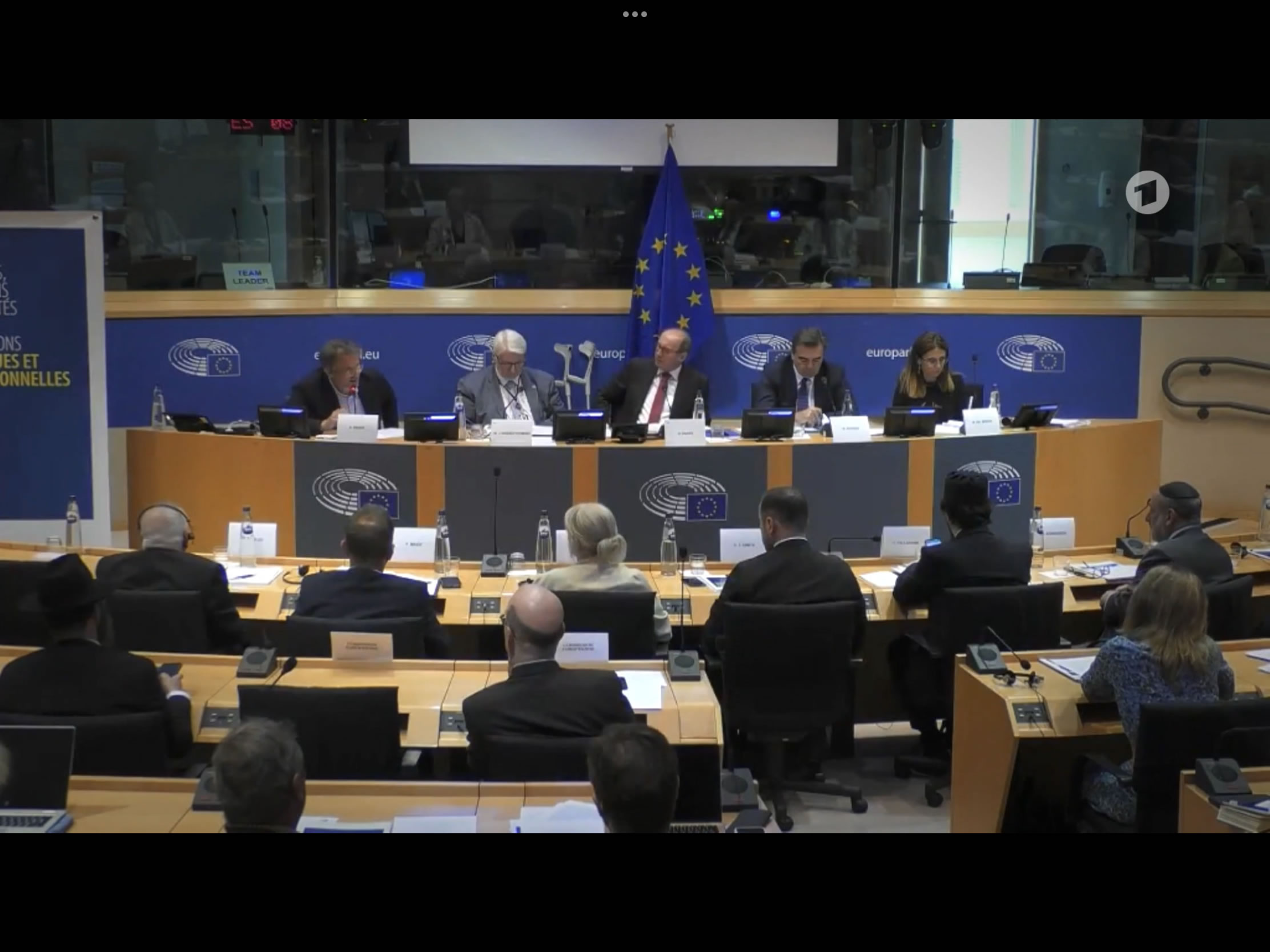
Debating ESI initiative for Ukrainian refugees in the European Parliament
InfoMigrants, Over a million refugees and asylum seekers in Germany: How will it 'manage' this time? 12 October 2022
SWR, Volle Turnhallen, leere Kassen – Droht eine neue Flüchtlingskrise? ("Full gyms, empty coffers - Is a new refugee crisis looming?") Online discussion with Gerald Knaus, 12 October 2022
WDR Studiogespräch: Gerald Knaus, Migrationsforscher ("Studio discussion: Gerald Knaus, migration researcher") TV Interview with Gerald Knaus, 11 October 2022
Phoenix, Zwischen Hilfsbereitschaft und Überforderung - Flüchtlingsgipfel in Berlin ("Between helpfulness and excessive demands - refugee summit in Berlin") TV debate with Gerald Knaus, 11 October 2022
Die Welt „Die größte Flüchtlingskrise seit den 40er-Jahren“ (""The biggest refugee crisis since the 1940s"."), Debate with Gerald Knaus and Niall Ferguson, 9 October 2022
Tagesschau, Überforderte Kommunen: Wieder mehr Menschen suchen Schutz in Deutschland
("Overstretched municipalities: More people seek protection in Germany again"), TV Interview with Gerald Knaus, 6 October 2022
Die Welt Migrationsforscher befürchtet „historischen Fluchtwinter“ ("Migration researcher fears "historic winter of refugees"") 2 October 2022
ZDF Markus Lanz vom 21. September 2022 ("Markus Lanz from 21 September 2022")
Gerald Knaus on German TV debate show Markus Lanz, 21 September 2022
MigAzin Migrationsforscher fordert Heistkosten-Hilfe für private Gastgeber
("Migration researcher calls for assistance for private hosts to cover the costs of the refugee camps") 20 September 2022
MDR, Migrationsexperte: Zahl der Geflüchteten wird im Winter steigen ("Migration expert: number of refugees will rise in winter") Radio interview with Gerald Knaus, 15 September 2022

